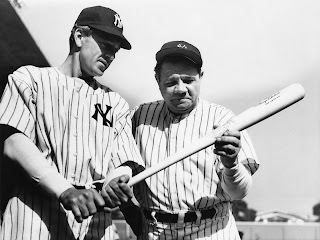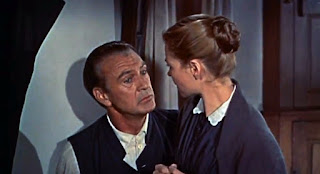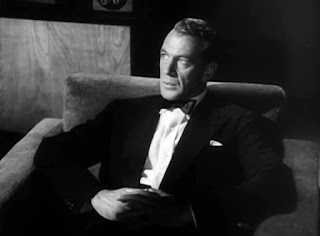Gary Cooper
 |
| Publicity photo c. 1936 |
Early Life
Cooper grew up at his family's ranch, working to help raise their cattle like a true cowboy. While attending high school, Cooper developed a profound interest in the arts. He decided to pursue a career as an artist, and spent time working in both Chicago and Helena. In 1924, Cooper's parents moved to Los Angeles and Cooper, who had yet to find steady employment in his chosen field, decided to move with them.
After a few weeks without any gainful employment, a couple of Cooper's friends invited him to audition for a job as a stunt rider at a small movie studio while he waited on his art career to pick up. Cooper, an experienced rider from his days working at his family's ranch, agreed to give it a try.
Early Career
Cooper slowly worked his way up the ladder by first landing an assortment of bit parts followed by some minor credited roles. Eventually, with help from his then-girlfriend and Hollywood superstar Clara Bow (with whom he had appeared in the hit film It), Cooper landed leading roles in several successful movies, including Children of Divorce, Wings, and Lilic Time. Cooper's popularity rose with each film and he quickly became one of Hollywood's rising stars.
Rise to Stardom
 |
| Gary Cooper in The Virginian (1929) |
Upon returning to Hollywood in 1932, Cooper resumed his acting career, albeit at a more sensible pace. While his films over the next few years were hit-or-miss, Cooper did star in several critical and box office hits, including A Farewell to Arms (the first of two Hemingway adaptations in which he would star), Now and Forever (where he appeared alongside Shirley Temple), and The Lives of a Bengal Lancer (one of the 1930s biggest adventure films).
Peak Years
Mr. Deeds Goes to Town (1936)
 |
| Publicity photo for Mr. Deeds Goes to Town (1936) with Jean Arthur. |
The Plainsman (1936)
 |
| Cooper in The Plainsman (1936), again alongside Arthur. |
Meet John Doe (1941)
 |
| Cooper in Meet John Doe (1941) with Barbara Stanwyck |
Cooper took most of 1937 off from filmmaking, and his return in 1938 was marked by several box-office failures. However, Cooper returned to form beginning in 1939, during which he filmed the adventure epics Beau Geste and The Real Glory, which were in turn followed by The Westerner and North West Mounted Police in 1940. While each of these films were box-office successes, none quite matched the dazzling heights of Cooper's 1936 hits. However, in 1941, Frank Capra offered to reunite with Cooper for the comedy Meet John Doe. Without even reading the script, Cooper accepted, trusting Capra implicitly after their success with Mr. Deeds. Cooper's faith in Capra proved to be well-founded; Meet John Doe opened to rave reviews for both Cooper and co-star Barbara Stanwyck, with whom Cooper shared a delightful on-screen chemistry. Meet John Doe was also a commercial hit, and Cooper was back on top of Hollywood.
Sergeant York (1941)
 |
| Cooper in Sergeant York (1941) |
The Pride of the Yankees (1942)
 |
| Cooper and Babe Ruth in The Pride of the Yankees (1942) |
The studio in question, Samuel Goldwyn Productions, was nervous about the film's prospects; sports movies were not particularly popular at the time, so it was hoped that the inclusion of a high-profile star (Cooper, in this case) would serve as a hedge against a possible box-office flop. Ultimately, The Pride of the Yankees was a hit, receiving an Academy Award nomination for Best Picture and a third nomination for Cooper for Best Actor.
For Whom the Bell Tolls (1943)
 |
| Cooper and Ingrid Bergman in For Whom the Bell Tolls (1943) |
Late Career
The Fountainhead (1949)
The low point of Cooper's career coincided with the release of The Fountainhead (1949). An adaptation of a novel by famed philosopher Ayn Rand, The Fountainhead was a highly-anticipated production. However, the film proved to be a colossal failure; a weak script which saw Cooper placed in a decidedly nontraditional role (a selfish anti-hero, diametrically opposed to the folksy "champion of the common man" which had defined his career) ultimately doomed the production.
Several explanations have been offered for Cooper's sudden downturn during this period. The first concerns the quality of the productions in which he starred; none of the films Cooper appeared in during this time were particularly well-executed. In addition, it's been suggested that the public's taste in movies evolved in the years after World War II, and Cooper's image as the "everyman's hero" simply wasn't that popular. Lastly, Cooper was simply getting old. In his mid-40s coming out of World War II, Cooper had been working in Hollywood for quite some time and his age was beginning to show. With each film, it was becoming increasingly difficult for audiences to embrace Cooper as a dashing young hero.
High Noon (1952)
 |
| Cooper with Grace Kelly in High Noon (1952) |
In 1952, Cooper's fortunes began to turn back around when he starred in the suspenseful western High Noon. An allegory of the practice of blacklisting, High Noon featured Cooper's portrayal of the weary yet dutiful Marshal Kane. Combined with Grace Kelly's performance as his young bride, Cooper once again excelled in the role of the honor-bound hero. While the production was not without controversy, High Noon was a hit and led Cooper to his second Academy Award win for Best Actor.
Friendly Persuasion (1956)
 |
| Cooper and Dorothy McGuire in Friendly Persuasion (1956) |
In 1956, Cooper again found himself in an unfamiliar role; that of an aging patriarch in Friendly Persuasion. While the part was decidedly new territory for Cooper (who had traditionally played bachelor roles), the film's theme of pacifism vs duty was becoming quite familiar to Cooper (Sergeant York and High Noon had tread much of the same ground) and he put on what was arguably one of his best performances. Cooper's ability to play to both the comedy and moral conflict of the story captivated audiences, and the picture was both a critical and commercial hit.
Man of the West (1958)
 |
| Cooper in Man of the West (1958) |
Later Years
Cooper appeared in only four films after completing Man of the West, none of which drew much attention. In 1961, Cooper retired for good. By that point, Cooper's health had seriously deteriorated; he had undergone operations for both prostate and intestinal cancer and was plagued by stomach ulcers. In February of that year, Cooper learned that he had inoperable cancer in his lungs and bones. On May 13, 1961, Gary Cooper passed away at his home in Holmby Hills (outside of Los Angeles), shortly after his 60th birthday.
Legacy
Working professionally in Hollywood for 36 years and leading in over 80 films, Cooper had a long and varied career. For the most part, Cooper usually found himself in the role of a hero, and while that role evolved over the course of his career, I believe that it was during his peak years in the late 30s and early 40s, the time during which he mastered the part of the "homespun hero", that Cooper really shined brightest.
For me, Cooper's performance in Mr. Deeds Goes to Town is easily one of my all-time favorites. While the popular image of the "perfect American hero" has changed over the years, I think that Cooper's role as the "common man's hero" will endure as a testament not only to the times in which he lived, but of the man himself.

